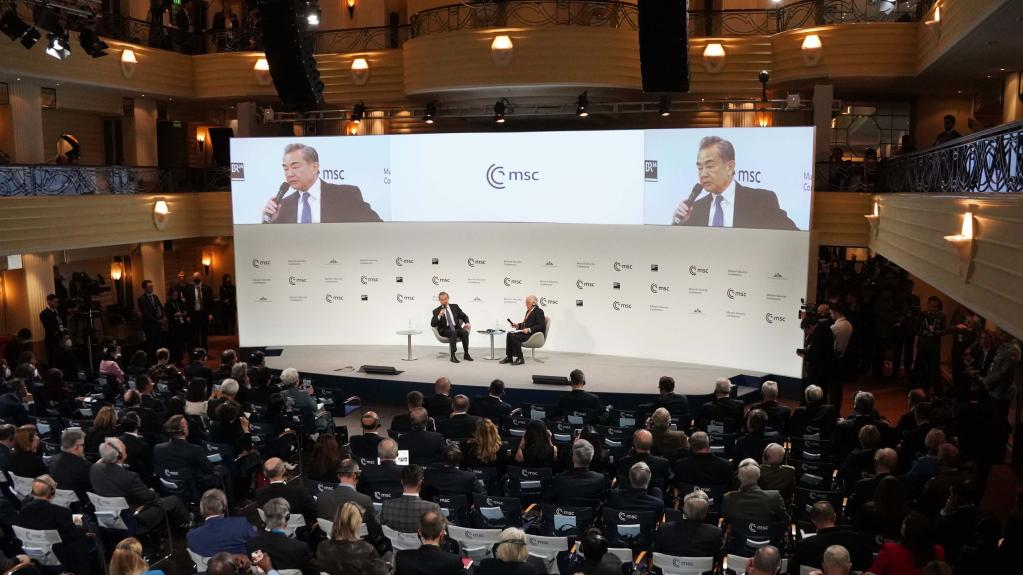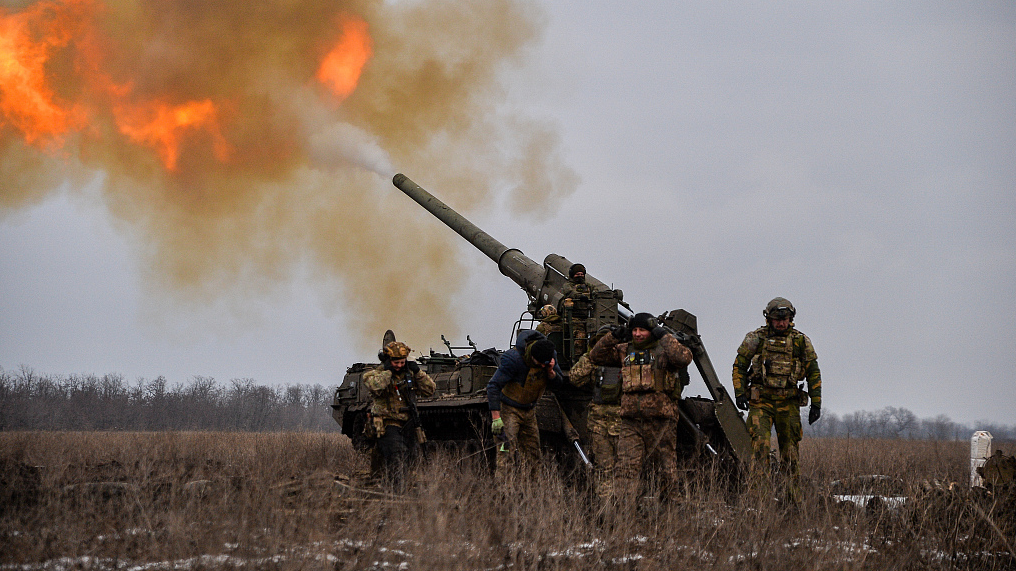
Wang Yi, a member of the Political Bureau of the Communist Party of China (CPC) Central Committee and director of the Office of the Foreign Affairs Commission of the CPC Central Committee, answers questions at the Munich Security Conference in Munich, Germany, February 18, 2023. /Xinhua
Wang Yi, a member of the Political Bureau of the Communist Party of China (CPC) Central Committee and director of the Office of the Foreign Affairs Commission of the CPC Central Committee, answers questions at the Munich Security Conference in Munich, Germany, February 18, 2023. /Xinhua
Editor's note: Hannan Hussain is a foreign affairs commentator and author. He is a Fulbright recipient at the University of Maryland, the U.S., and a former assistant researcher at the Islamabad Policy Research Institute. The article reflects the author's opinions and not necessarily the views of CGTN.
During his recent trip to Europe, Wang Yi, director of the Office of the Foreign Affairs Commission of the Communist Party of China (CPC) Central Committee, delivered a compelling case for China's principled diplomacy over the Ukraine issue. Beijing's close engagement with top European partners support each party's concerns, while setting the stage for Wang's Moscow visit in the lead-up to China's peace proposal.
By emphasizing prompt de-escalation in the Ukraine crisis, China refocuses attention on how all roads leading to a negotiated outcome run through peace talks. "China is not a party to this crisis in Ukraine, but we are not standing idly by. Nor have we thrown fuel on the fire," said Wang in Munich last weekend. The Chinese peace initiative is a stark contrast to measures that have escalated the crisis, since the end goal is to avoid a protracted conflict.
Wang advocated for a political solution when meeting with European leaders, where recognition of each side's concerns was a key takeaway. China's support for a long-term solution holds value to Europe. But, what structures are required for the long-term peace and stability of Europe? And how can Europe contribute to the realization of a strategic freedom?
Legwork for such introspection can cultivate favorable perceptions for common security between parties that are concerned with the conflict. Nearly a year since the crisis erupted, effective diplomacy should be "supporting talks for peace" – China's stated position.

Ukrainian artillery teams fire at Russian positions in Bakhmut, Ukraine, February 5, 2023. /CFP
Ukrainian artillery teams fire at Russian positions in Bakhmut, Ukraine, February 5, 2023. /CFP
It's essential to discard attitudes that resist Ukraine-Russia peace talks. "China is not willing to see a protracted and expanded Ukraine crisis and stands ready to work with the international community to prevent the situation from worsening and keep fighting for peace," Wang told Ukrainian Foreign Minister Dmytro Kuleba on the sidelines of the Munich Security Conference. Cooperative diplomacy forms the crux of China's forthcoming peace initiative over Ukraine, and was given a welcome reception by Germany.
China's speech and actions stand aligned for a just peace. The legitimate security concerns for all parties involved need to be treated on equal footing. Wang's last address to the Munich Security Conference, and China's sustained engagement with Russia and Ukraine to date, can maintain common-ground for collective peace. Beijing's principled resolve has not changed, while China warned Europe the crisis could drag on for a long time to come. Hence, the more damage parties may suffer by virtue of economic and energy repercussions.
China's opposition to unilateralism boosts its appeal as a major facilitator for peace in Ukraine. Its past diplomatic efforts were well-received in the Global South, and constructive relationships with Russia and Ukraine afford it a strong vantage point to bring the parties together. China is leveraging its strong communication with all parties to support the multilateral outlook of its forthcoming proposal. It's time for the involved countries to overcome their differences and resolve challenges through candid dialogue.
Using the Ukraine crisis as a pretext to target China's time-tested relationship with Moscow is counterproductive to peace. The principles of non-alliance, non-confrontation and non-targeting "of any third party" dominate their partnership, and past Russia-China exchanges have catered to peace talks and de-escalation. Wang's visit to Moscow will make no exception to that diplomatic foresight, but will prioritize it in the lead-up to the first anniversary of the crisis.
China's well-rounded and timely initiative on Ukraine offers a chance for more effective diplomacy to become a bridge between the East and West. Only a political settlement of hotspot issues such as the Ukraine crisis through dialogue and negotiation is conducive to all and is conducive for peace.
(If you want to contribute and have specific expertise, please contact us at opinions@cgtn.com. Follow @thouse_opinions on Twitter to discover the latest commentaries in the CGTN Opinion Section.)